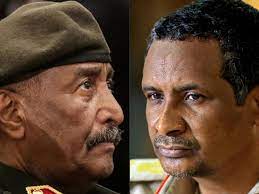Sudan’s tragedy : on the power struggle between two generals
The feuding Generals should agree on a time-bound transition to democracy
For 30 years, Omar al-Bashir, a former military officer, ruled Sudan with an iron hand and indiscriminate violence. When he was toppled in April 2019 in a mass uprising, many hoped that the resource-rich country in the Horn of Africa would finally get a chance to move towards a freer society with a representative and responsive administration. But the tragedy of Sudan is that the monstrous regime that Mr. Bashir built outlasted his reign. Within two years of his fall, the military was back, and now, a power struggle between the top two generals has pushed Sudan to the brink of a civil war. Dozens of civilians have already been killed in fighting that broke out on Saturday in Khartoum and other parts of the country between the military and the Rapid Support Forces (RSF), a notorious paramilitary group. Despite international calls for truce, Lt.Gen. Abdel Fattah al-Burhan, the military chief as well as the head of the Sovereignty Council, the transitional administration, and his deputy, Lt.Gen. Mohamed Hamdan Dagalo, who commands the RSF, have refused to negotiate, blaming each other for the attacks. Mr. Dagalo, who has close ties with Russia’s Wagner private military company and Saudi Arabia, claims that the RSF has taken control of the presidential palace and has vowed to bring Gen. Burhan to justice, while the military has dismissed such claims and launched air strikes against RSF sites.
Just two years ago, the two generals stood hand in hand when they ousted a civilian transition government and took over the reins of the country. Faced with international isolation and domestic pressure, they agreed to transfer power back to the civilians. But differences emerged on who should control the post-transition military. Gen. Burhan supports the integration of the RSF into the regular military and transition to civilian government to take place in two years, while Gen. Dagalo, who fears that he would lose his clout, wants to delay it by 10 years. Discord grew into mistrust and mistrust led to fighting. And the fighting could drag the country, which has a history of internal strife, into an all-out civil war. Sudan’s generals are known for their scant regard for the welfare of their people. The country is struggling with an economic crisis, with rocketing inflation and a burning hunger problem. The last thing Sudan wants now is a civil war. If the priority of the generals is to address Sudan’s basic problems, they should pay attention to the call for a truce and dialogue, and commit themselves to a timeline-sensitive democratic transition. Decades of military rule in Sudan have resulted in a lot of atrocities. Generals Burhan and Dagalo should not tread the same course
